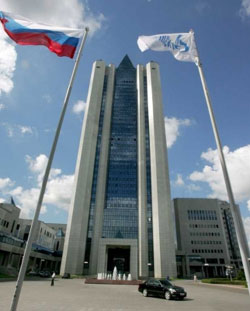Gazprom in crisis: a chance for reform
on
Gazprom in crisis: a chance for reform
The economic crisis and the collapse of gas prices have shown Russian gas giant Gazprom for what it is: a bloated and wasteful bureaucratic monster, which is hurting both the Russian and the EU economy. Gazprom needs to downsize, tighten its belts and reform – and there never was a better time to do it than now. What is more, the EU should help out, and offer Russia a new legal framework for energy cooperation to replace the Energy Charter.
 |
| Gazprom headquarters in Moscow |
For a few years, Gazprom officials claimed it would become the world’s most valuable company with a market capitalization of $1 trillion. In May 2008, Gazprom’s market capitalization exceeded $350 billion, and in June 2008, Gazprom Chairman Alexei Miller predicted that the oil price would soon reach $250 per barrel. Since the gas price is tied to the oil price Gazprom’s sales and value would rise accordingly. But since then almost everything has gone wrong for Gazprom and its current market capitalization has stabilized around $140 billion.
Russia’s leading company has greatly underperformed the Russian stock market and virtually all relevant indexes. It has become evident that Gazprom suffers from a profound structural crisis, and it needs to downsize, tighten its belts and reform. The global financial crisis hit all, but the Russian oil sector increased its production and exports last year, while gas exports fell by 11 percent and Gazprom’s production by 16 percent because of lacking demand.
Outcompeted
Seldom has a giant been hit by so many big blows in one year. First, by repeatedly cutting its deliveries without prior warning, Gazprom has acquired a solid reputation as an unreliable supplier. Second, after the United States has suddenly started mass-producing cheap shale gas and become the biggest gas producer in the world, the European market is flooded with new liquefied natural gas (LNG). Third, there
| It has become evident that Gazprom suffers from a profound structural crisis, and it needs to downsize, tighten its belts and reform |
Since Gazprom no longer seems invincible, some are turning their back on it, while others attack it. Many customers have sharply reduced their purchases from Gazprom, and the question is to what extent they will return. How much of the demand has disappeared because of the crisis, temporarily high gas prices, energy savings or dissatisfaction with Gazprom as such? Assessments vary greatly.
Within Russia, its competitors Rosneft and Novatek are demanding better access to Gazprom’s pipelines, and since they have strong political support, they are swiftly gaining market share at the expense of Gazprom, whose share used to be 85 percent, but now it has fallen to 75 percent, and it is likely to decline more.
Defensive
Sensibly, in the last year, Gazprom has quickly altered its policy. Initially, it did so ad hoc, but as many steps are coming together, this is gradually becoming a new, defensive strategy. One of its first steps was to reduce its purchases of Turkmen gas. Gazprom did so with a bang. In April 2009, it suddenly and unilaterally halted the gas flow from Turkmenistan, which caused an explosion in the pipeline on Turkmen territory, blocking further gas sales to Russia. After the Turkmens had repaired the pipeline, Gazprom refused to take the agreed volumes at the contracted price, although it had a take-or-pay contract. Only in December 2009, Russia and Turkmenistan agreed on sharply reduced Turkmen contracted deliveries to Russia for 2010.
Turkmenistan responded by speeding up the construction of a gas pipeline to China, which was completed in December 2009. By 2013, China is planning to buy 40 billion cubic meters of natural gas from Turkmenistan, while the Russian-sponsored new pipeline project on the eastern shore of the Caspian Sea from Turkmenistan to Russia, which President Putin announced in May 2007, is going nowhere and will most likely never be built. The Central Asian gas market is going through a metamorphosis, and for the future most Central Asian gas supply is likely to go to China without Russian intermediation.
Central Asia is thus capturing a large chunk of the Chinese gas market before Russia can get there. In 2007, Gazprom forced TNK-BP to abandon the giant gas field Kovykta in East Siberia, from which it could have been profitable to build a pipeline to China. Now Kovykta will remain stranded and barely exploited for years to come, and Russia has no prospects of exporting gas to China through pipelines for many years to come. The only Russian gas sold to China is LNG from Sakhalin Energy, where Gazprom muscled itself into a project led by Royal Dutch Shell and production of LNG started in 2009.
Gazprom has also decided to postpone the two giant fields Shtokman in Barents Sea and Yamal. These steps make perfect sense because at present Gazprom is not likely to need this gas, and with its high production costs, this gas might never become profitable if Gazprom is to produce it.
Since the United States has no need for LNG because of its new alternative gas production, Gazprom has also abandoned its plans to sell LNG to the US, and it seems likely to ditch or at least delay its plans on building more liquefaction plants.
For the last one and a half years, Gazprom’s long-term European contracts with prices that change quarterly in relation to a mixture of oil indexes half a year earlier have exceeded the European spot market prices by large margins, sometimes being even twice as high. For a year, Gazprom ignored these price pressures, but in February it also started changing this policy, allowing four major European client companies to buy 10-15 percent of their contracted gas at lower spot market prices. In parallel, Gazprom has offered Belarus and Ukraine roughly one-third lower prices than for the European market in new long-term agreements, but the cost of these concessions are not being born by Gazprom but by the Russian state. The state has waived the export tariffs, while Gazprom benefits from larger sales volumes and lower transit tariffs.
Wasteful
Yet, in one regard, Gazprom has not changed. It is still insisting on building two new pipelines, Nord Stream from Russia to Germany through the Baltic Sea and South Stream through the Black Sea over the Balkans to Italy. Neither of these two projects makes any commercial sense, as neither supply nor demand exists for them, and each would be exorbitantly expensive. Yet, the construction of Nord Stream has just started. It is not unlikely that only the first of two planned Nord Stream pipelines will be built, and South Stream has always seemed a chimera. The April 2010 gas agreement with Ukraine gives Russia a good excuse to forget about South Stream. The many other gas pipeline projects are hopefully already jeopardized.
In the end, Gazprom’s fundamental shortcoming is that it is an extremely wasteful and poorly managed company. In their excellent 2009 book, Putin and Gazprom, Boris Nemtsov and Vladimir Milov argued that Gazprom’s real aim is to transfer assets to officials through kickbacks on pipeline construction and equity purchases, illicit transfer of Gazprom shares, and transfer pricing in international sales. Gazprom’s only actual comparative advantage is its extraordinary access to Russian state power. However, sooner or later, even its state protectors will say that enough is enough. How many tens of billions can a state company really be allowed to waste? Clearly, the powers that be have moved some of their sympathies to Rosneft and Novatek.
 |
| Gazprom sponsors German football team Schalke '04 to improve its image in Europe |
The current recession has exposed Gazprom’s weaknesses and this is a good time for long-desired reform. The first step should be to divide Gazprom from the state. Even if the majority of Gazprom remains state-owned, it must gain integrity as an autonomous joint stock company. It should be deprived of its regulatory functions to be transferred to an independent regulatory agency. Since the Gazprom management has failed so miserably, a clean sweep of the existing management and installation of a new, competent management from the private sector are desired. Nord Stream and South Stream should be abandoned instantly, since neither appears commercially viable.
In a rational market economy, a conglomerate such as Gazprom would not exist. Non-core assets from farms to television companies should be sold off. Arguably, many such assets, from Gazprombank to Gazprom’s insurance company, have already been sold off in tacit insider privatizations. Production of gas should be separated from transportation and sales in different companies. Undeveloped medium-size and small fields ought to be auctioned off to independent gas producers. The gas pipeline system could stay state-owned but be separated from production and be open to all on equal pricing. As a consequence, the flaring of 40 billion cubic meters of gas each year could abate and Russia would benefit from a huge cheap additional supply of gas, while air pollution would decline.
Gradually, neglected or mothballed licenses should be auctioned off, which would strengthen independent gas producers. No doubt, they would quickly outcompete Gazprom in production in the same way as Russia’s private oil producers dominate that industry. In such a business climate, foreign investors should also be welcome. Production costs would decline and plenty of medium-size gas fields could come on stream, so that the remote giant fields will not be needed for the next decade. In a new era of cheap gas, low production costs will be the key to success, and medium-sized independents are likely to be among the winners.
Outstanding opportunity
Russia could live well on cheaply-produced gas and low energy prices set on a competitive market. Differentiation in taxation between the oil and gas industry would no longer be justified, and equal taxation should be introduced, increasing tax revenues. Oil and gas would compete on equal conditions. It will be much easier to render Gazprom transparent and improve its governance on a competitive market. Gazprom will stop being a slush fund for Russian politics, offering the country a serious new chance to become a democracy.
For the European Union, Gazprom’s new weakness offers an outstanding opportunity to clean up gas trade with Russia. The European Union and Russia should come together and reform the European and Russian gas sectors, which are both in crisis. The centerpiece of an all-European gas reform should be marketization and the unbundling of transportation and production of gas.
The Europeans could take up Russian President Dmitri Medvedev’s proposal to draft a new legal framework for energy cooperation meant to replace the Energy Charter of 1994, which almost all other European countries have ratified. Both Russia and Europe need an agreed legal framework for international energy cooperation. If Russia accepts the application of the Energy Charter’s transit protocol, it could benefit from export revenues from international usage of its extensive trunk pipeline network.
Gazprom’s current crisis offers the best opportunity ever for Russian and European energy reform. The arguments for a profound reform of Russia’s gas sector have never been stronger. The European Union needs to take up the baton.
|
Who is Anders Åslund?
|


 Anders Åslund is a senior fellow at the Peterson Institute for International Economics and author most recently of Russia’s Capitalist Revolution: Why Market Reform Succeeded and Democracy Failed. He has served as the director of the Russian and Eurasian Program at the Carnegie Endowment for International Peace since 2003 and as co-director of the Carnegie Moscow Center's project on Economies of the Post-Soviet States. He is also an adjunct professor at Georgetown University. He was a professor at the Stockholm School of Economics and director of the Stockholm Institute of East European Economics. He is a member of the Russian Academy of Natural Sciences, co-chairman of the Economics Education and Research Consortium and chairman of the Advisory Council of the Center for Social and Economic Research (CASE), Warsaw. He earned his doctorate from Oxford University and worked as Swedish diplomat in Kuwait, Poland, Geneva and Moscow. He is author and co-author of ten books about recent political and economic developments in Russia and Eastern Europe. Professor Aslund is a member of the editorial board of European Energy Review.
Anders Åslund is a senior fellow at the Peterson Institute for International Economics and author most recently of Russia’s Capitalist Revolution: Why Market Reform Succeeded and Democracy Failed. He has served as the director of the Russian and Eurasian Program at the Carnegie Endowment for International Peace since 2003 and as co-director of the Carnegie Moscow Center's project on Economies of the Post-Soviet States. He is also an adjunct professor at Georgetown University. He was a professor at the Stockholm School of Economics and director of the Stockholm Institute of East European Economics. He is a member of the Russian Academy of Natural Sciences, co-chairman of the Economics Education and Research Consortium and chairman of the Advisory Council of the Center for Social and Economic Research (CASE), Warsaw. He earned his doctorate from Oxford University and worked as Swedish diplomat in Kuwait, Poland, Geneva and Moscow. He is author and co-author of ten books about recent political and economic developments in Russia and Eastern Europe. Professor Aslund is a member of the editorial board of European Energy Review.
Discussion (0 comments)